The Rise and Fall(?) of
America
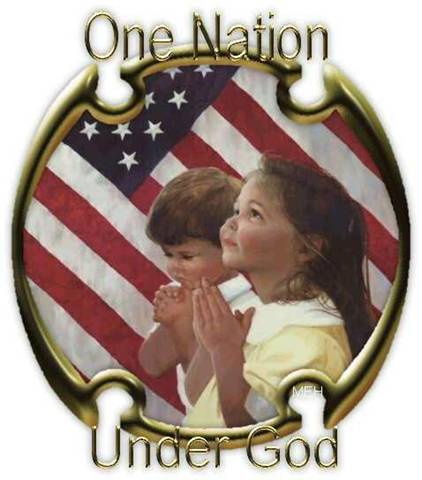
America's Godly Heritage
"The propitious smiles of heaven can never be expected on a nation that disregards the eternal rules of order and right which Heaven itself has ordained."
(George Washington, 1789 Inaugural Address)
"Of the 22 civilizations that have appeared in history, 19 of them collapsed when they reached the moral state America is in today."
(Attributed to Arnold Toynbee, acclaimed historian who died in 1975)
(This is a condensed version of the booklet published by WallBuilders, Inc. of the narrative of their video cassette and audio tape "America's Godly Heritage," by David Barton, all rights reserved. Used with permission.)

Does America really have a Godly heritage? Did you realize that most of the fifty-five Founding Fathers who worked on the Constitution were members of orthodox Christian churches and many were even evangelical Christians? We don't hear that part of our history any more. There are so many things that we no longer hear today. For example, we are now told that our Founding Fathers were atheists, agnostics, and deists; but consider this statement by John Adams:
"The general principles on which the fathers achieved independence were ... the general principles of Christianity... I will avow that I then believed, and now believe, that those general principles of Christianity are as eternal and immutable as the existence and attributes of God."
One of the many proofs of John Adam's claim is found in a book by the American Tract Society. The American Tract Society - which today still publishes Gospel tracts and Gospel literature for soul winning, evangelization, etc. - existed in the early 1800's. While it is fascinating to read these old Bible tracts and the messages they contain, it is even more fascinating to note the authors of these Gospel tracts: several of the tracts were written by Founding Fathers who signed our founding documents!
Another Founder with succinct declarations about the role of Christianity in American government was John Quincy Adams, who had a lengthy and distinguished political career. He served as a foreign ambassador under Presidents George Washington and John Adams, as Secretary of State under President James Monroe as a U.S. Representative, a U.S. Senator, and as the young nation's sixth President. John Quincy Adams, in his speech on July 4th, 1837, at Newburyport, asked the crowd:
"Why is it that, next to the birthday of the Savior of the World, your most joyous and most venerated festival returns on this day [on the Fourth of July]?
Is it not that, in the chain of human events, the birthday of the nation is indissolubly linked with the birthday of the Savior? That it forms a leading event in the progress of the gospel dispensation? Is it not that the Declaration of Independence first organized the social compact on the foundation of the Redeemer's mission upon earth? That it laid the cornerstone of human government upon the first precepts of Christianity?"
And on he goes for the next sixty pages. John Quincy Adams stressed that the biggest victory won in the American Revolution was that Christian principles and civil government would be tied together in what he called an "indissoluble" bond. But today we hear just the opposite.....
Other significant Founders were outspoken about their Christian beliefs. For example, John Jay, the original Chief Justice of the U. S. Supreme Court and one of the three men most responsible for the Constitution, declared:
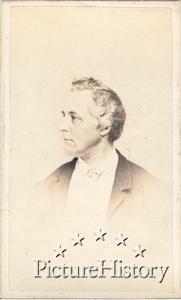
"Providence has given to our people the choice of their rulers, and it is the duty - as well as the privilege and interest - of our Christian nation to select and prefer Christians for their rulers."But was John Jay competent to offer such a statement? Yes! He was the original Chief Justice and one of the three men most responsible for our having the Constitution today - and he said that we should elect Christians for our rulers!
George Washington's "Farewell Address" is yet another aspect of our heritage which has disappeared from student texts. His "Farewell Address" once appeared as a separate school textbook for over a century. Students were taught that Washington's "Farewell Address" was the most significant political speech ever delivered to the nation. In his "Farewell Address" he reminded America what had brought us to success, and then warned us about what must be done to continue it. Amazingly, his "Farewell Address" has not been seen in most textbooks for nearly four decades. Why? Doesn't Washington have anything to offer the nation today? No, apparently the problem with his "Farewell Address" today is its religious emphasis, for four of his dozen or so warnings to the nation were overtly religious. It is interesting to note that in the last five years his "Farewell Address" has begun to reappear in college textbooks - minus the four religious warnings. In his "Farewell Address,"Washington pointed out that the two foundations for political prosperity in America were religion and morality, and that no one could be called an American patriot who attempted to separate politics from its two foundations. He explained:
"Of all the dispositions and habits which lead to political prosperity, religion and morality are indispensable supports. In vain would that man claim the tribute of patriotism, who should labor to subvert these great pillars."Washington believed that if an individual attempted to separate religion and morality from politics, he could not be called an American patriot. These types of statements we do not hear much any more, but such were the statements of America's Founders - the statements of America's history. Our Founding Fathers delivered to us a system of government which has enjoyed unprecedented success: we are now the world's longest on-going constitutional republic. Two hundred years under the same document - and under one form of government - is an accomplishment unknown among contemporary nations.
Where, then, did our Founding Fathers acquire the ideas that produced such longevity? Other nations certainly had access to what our Founders utilized, yet evidently chose not to. From what sources did our Founders choose their ideas? This question was asked by political science professors at the University of Houston. They rightfully felt that they could determine the source of the Founders' ideas if they could collect writings from the Founding Era and see whom the Founders were quoting.
The researchers assembled and searched 15,000 writings from the Founding Era. That project spanned ten years; but at the end of that time, the researchers had isolated 3,154 direct quotes made by the Founders and had identified the source of those quotes. Surprisingly, the researchers discovered that....34% of the Founders' quotes came directly out of the Bible. Not only that, but it was found that many of the Founders' other quotes were taken from men who had used the Bible to arrive at their own conclusions.
Numerous components of our current government can be shown- - through those early writings - to have their source in Biblical concepts. For example, the concept for three branches of government can be found in Isaiah 33:22; the logic for the separation of powers was based on Jeremiah 17:9; the basis of tax exemptions for churches was found in Ezra 7:24; and there are many other examples. This Biblical heritage was so well understood during the early years of the nation - and the writings of the numerous Founding Fathers were so well known - that in later years the Supreme Court ruled according to the Founders' intention, keeping Biblical principles as the basis. For example, notice this ruling by the U. S. Supreme Court in 1892:
"No purpose of action against religion can be imputed to any legislation, state or national, because this is a religious people.... This is a Christian nation." What would lead the Court to conclude that we are a Christian nation? The Court provided 87 different historical precedents to support its conclusions. The Court quoted the Founding Fathers, the acts of the Founding Fathers, the acts of the Congresses, the acts of the state governments, etc. At the end of 87 precedents the Court explained that it could continue to cite many additional precedents, but that certainly 87 were sufficient to conclude that we were a Christian nation. Keep in mind that the Court provided 87 precedents in this case. This is important, because the Courts base their decisions on precedents. To the Court, it is important to go back and examine both history and rulings from previous cases so that it can continue to be consistent in its present rulings.
In 1844, a school in Philadelphia announced that it would teach its students morality, but not religion. It believed that it didn't need Christianity and the Bible, that it could teach morality without them (sounds just like schools today!). This policy - among others - caused this case to come before the U. S. Supreme Court. Some of the Justices on the Court at this time had been appointed by James Madison. Notice what the Supreme Court told that school:
"Why may not the Bible, and especially the New Testament ... be read and taught as a divine revelation in the [school] - its general precepts expounded . . . and its glorious principles of morality inculcated? . . . Where can the purest principles of morality be learned so clearly or so perfectly as from the New Testament?"The Supreme Court of the United States ruled that schools would teach Christianity and the Bible - the source of morality. Today, we hear just the opposite. Few realize that today's rulings by the Court often repudiate rulings delivered by the Founding Fathers themselves! In 1811 a court made a ruling which was subsequently cited by the U. S. Supreme Court. That court declared:
"Whatever strikes at the root of Christianity tends manifestly to the dissolution of civil government."
The court explained (citing a man who had distributed writings that contained accusations and profanities against Jesus Christ and the Word of God): an attack on Jesus Christ was an attack on Christianity; and an attack on Christianity was an attack on the foundation of the country; therefore, an attack on Jesus Christ was equivalent to an attack on the country! And this case was in 1811 - nearly two decades after the First Amendment was in place. Its intent was well understood, as evidenced by court rulings after the First Amendment. For example, in 1799 a court declared:
"By our form of government, the Christian religion is the established religion; and all sects and denominations of Christians are placed on the same equal footing."
Again, note the emphasis: "We do want Christian principles - we do want God's principles - but we don't want one denomination to run the nation." In fact, The clear understanding of the First Amendment for a century-and-a-half was that it prohibited the establishment of a single national denomination. National policies and rulings in that century-and-a-half always reflected that interpretation. For example, in 1853, a group petitioned Congress to separate Christian principles from government. They desired a "separation of church and state" with chaplains being turned out of the congress, the military, etc. Their petition was referred to the House and the Senate Judiciary Committees, which investigated for almost a year to see if it would be possible to separate Christian principles from government. Both the House and the Senate Judiciary Committees returned with their reports. The following are excerpts from the House report delivered on March 27, 1854 (the Senate report was very similar):
"Had the people [the Founding Fathers], during the Revolution, had a suspicion of any attempt to war against Christianity, that Revolution would have been strangled in its cradle. At the time of the adoption of the Constitution and the amendments, the universal sentiment was that Christianity should be encouraged, but not any one sect [denomination].... In this age, there is no substitute for Christianity. ... That was the religion of the founders of the republic, and they expected it to remain the religion of their descendants."Two months later, the judiciary Committee made this strong declaration:
"The great, vital, and conservative element in our system [the thing that holds our system together] is the belief of our people in the pure doctrines and divine truths of the Gospel of Jesus Christ."
"The First Amendment has erected 'a wall of separation between church and state.' That wall must be kept high and impregnable."
This was a new philosophy for the Court. Why would the Court take Jefferson's letter completely out of context and cite only eight of its words? Dr. William James, the Father of Modern Psychology - and a strong opponent of religious principles in government and education - perhaps explained the Court's new strategy when he stated:
"There is nothing so absurd but if you repeat it often enough people will believe it."
This statement precisely describes the tact utilized by the Court in the years following its 1947 announcement. The Court began regularly to speak of a "separation of church and state," broadly explaining that, "This is what the Founders wanted - separation of church and state. This is their great intent." The Court failed to quote the Founders; it just generically asserted that this is what the Founders wanted.
The Court continued to talk about separation until June 25th, 1962, when, in the case Engel v. Vitale, the Court delivered its first ever ruling which completely separated Christian principles from education; the case struck down school prayer. In that 1962 case, the Court redefined the meaning and application of a single word: the word "church." For 170 years prior to that case, the word "church" - as used in the phrase "separation of church and state" - was defined to mean "a federally established denomination." However, in 1962 the Court explained that the word "church" would now mean "a religious activity in public." This was the turning point in the interpretation of the First Amendment.
Understand what the Court had just announced: no longer would the First Amendment simply prohibit the establishment of a federal denomination, it now would prohibit religious activities in public settings. This current doctrine of separation is a brand new doctrine; it is not something from the Founding Fathers, and it is not in any founding document.
School prayer was the first casualty of the redefinition of the First Amendment in 1962. School prayer had never before been challenged, for school prayer had never established a national denomination and therefore had always been acceptable. But under the new definition, school prayer definitely was a religious activity in public and was therefore now deemed to be unconstitutional.
That 1962 case which first redefined the First Amendment and then removed school prayer was notable in a number of aspects. Recall that the 1892 Supreme Court case offered 87 precedents to maintain the inclusion of Christian principles in our laws and institutions. This 1962 case which removed school prayer was just the opposite; it was the first case in Court history to use no precedents - the Court quoted "zero" previous legal cases. Without any historical or legal base, the Court simply made an announcement: "We'll not have prayers in schools anymore; that violates the Constitution." A brand new direction was taken in America.
Within a 12-month period of time, in two more cases in 1963, the Court had not only removed prayer but also Bible reading, religious classes, and religious instruction - this was a radical reversal. In June 17, 1963, the Court not only reaffirmed its ban on school prayer from the previous year but further reached out and banned school Bible reading. Recall that in the brief survey already presented, the Founders relied on the Bible; early school textbooks quoted the Bible and used it as part of the alphabet; and earlier Supreme Court cases ruled that a school must teach religion and the Bible. Therefore, on what possible basis can the 1963 Court justify its ruling to stop the use of the Bible in schools? The Court always explains its decision in written form; the 1963 case was no different. If you go to a law library and examine the text of that decision, you will find why the Bible had to be removed from schools. In its written decision, the Court noted that:
"If portions of the New Testament were read without explanation, they could be and ... had been psychologically harmful to the child."
For the second time in a year, this was a case lacking both historical and legal precedent. Again, the Court simply made a new announcement of policy; in essence: "No more Bible reading in schools." The courts continued to extend the new boundary outward. In 1965, a court determined that it was permissible for students to pray over their lunch at school so long as no one knew they were praying - they could not say words or move their lips, but they could pray if no one knew about it! In 1967, a court took a 4-line nursery rhyme used by a kindergarten class and declared the nursery rhyme unconstitutional. The court explained that although the word "God" was not contained in this nursery rhyme, if someone were to hear the rhyme, he might think that it was talking about God - and that would be unconstitutional! Regarding the posting of the 10 Commandments in schools, the Court ruled:
"If the posted copies of the Ten Commandments are to have any effect at all, it will be to induce the schoolchildren to read, meditate upon, perhaps to venerate and obey, the Commandments.... [This] is not ... a permissible ... objective." When the Court declares something unconstitutional, it is inferring that our Founding Fathers -the men who drafted the Constitution - would have opposed it. James Wilson was a signer of the Constitution, an original Justice on the U. S. Supreme Court, and coauthor of America's first Commentaries on the Constitution. Certainly he is qualified to speak to the intent of the Constitution - and he explained:
"Human law must rest its authority ultimately upon the authority of that law which is Divine.... Far from being rivals or enemies, religion and law are twin sisters, friends, and mutual assistants. Indeed, these two sciences run into each other. The Divine law. . . forms an essential part of both."Our Founders were clear about the important and inseparable role that religious principles played in the official public life of the nation. Did the Court's decision to change national policy, and to separate God's principles from its rulings, have any effect? That which occurred with students following the removal of religious principles was perfectly predicted by George Washington in his "Farewell Address" when he warned:
"Let us with caution indulge the supposition that morality can be maintained without religion. Whatever may be conceded to the influence of refined education on minds ... reason and experience both forbid us to expect that national morality can prevail in exclusion of religious principle."Washington warned that to remove religious principles would be to lose national morality. Notice the accuracy of his warning. It is significant to note that every moral measurement which exists for students breaks violently upward with the separation of religious principles from the lives of students in 1962-63: pregnancies for unwed girls, sexually transmitted diseases, etc. There has been dramatic increase for every moral measurement among youth. Prior to 1963, there were never more than 2 consecutive years in which SAT scores either rose or declined; but beginning in 1963, scores plummeted for 18 consecutive years - unprecedented!
What happened in the nation when we separated religious principles from public arenas? What do you think happens when you start telling students, "You can't see the Ten Commandments, you might obey them ("don't steal", "don't kill," etc.)"? That has to have an effect on behavior. It did. Washington, in yet another warning from his "Farewell Address," accurately predicted what has occurred. He said:
"Let it simply be asked, `Where is the security for life, for reputation, and for property, if the sense of religious obligation desert?"
The sense of religious obligation has deserted; and clearly there now seems to be no security for life, for reputation, or for property. For example, consider violent crime. After having remained statistically stable for years, since the removal of religious principles in 1962, the number of violent crimes has now surpassed population growth by 794 percent, causing the United States to become the World's Leader in violent crime. Perhaps the best explanation for this increase was given by Thomas Jefferson, who succinctly stated why Christianity was the best friend of government. Jefferson explained:
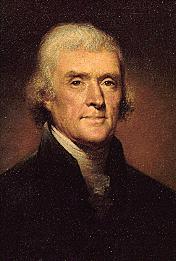
"The precepts of philosophy ... laid hold of actions only. . . . [But Jesus] pushed his scrutinies into the heart of man, erected his tribunal in the region of the thoughts, and purified the waters at the fountain head."Where the law says: "Don't kill," in Matthew 5, Jesus says: "Don't get angry; don't hate." Clearly, if you prevent the anger and the hate, you have prevented the murder. Where the law says: "Don't commit adultery," Jesus says: "Don't lust in your heart." If you control the lust, you have controlled the adultery. The Founders pointed out that only religion could stop crime before it started, because all crime comes out of the heart; and if you can't control the heart, you can't control crime. This is why Christian principles were so valuable to government. Most of the Founders expressed this same understanding. John Adams pointed out that there was no government in the world able to make someone do what was right, or able to control those who did not wish to be controlled. Adams explained:
"We have no government armed with power capable of contending with human passions unbridled by morality and religion.... Our constitution was made only for a moral and religious people. It is wholly inadequate to the government of any other."The Founders believed that the Constitution would work only for people who had internal restraints and internal controls - for people who would use the Word of God as their standard. We have moved away from that, and clearly the Constitution apart from religious principles is not working the way it should - a fact evident on all the charts and statistics. Look at what the Founding Fathers - the men who signed the founding documents - placed in their own new state constitutions. For example, notice Delaware (the other states were very similar):
Every person appointed to public office shall say "I do profess faith in God the Father, and in Jesus Christ His only Son, and in the Holy Ghost, one God, blessed for evermore; and I do acknowledge the holy scriptures of the Old and New Testament to be given by divine inspiration."This was the requirement to be a politician - a requirement set up by the Founding Fathers! But notice that this requirement is consistent with the First Amendment because it did not require someone to be from one specific denomination to hold public office. It did say that you had to understand God's principles - you had to understand the Word of God to hold office. The different state constitutions contained several common components. For example, notice the requirements in Pennsylvania and Vermont (the other states were very similar):
And each member [of the legislature], before he takes his seat, shall make and subscribe the following declaration: "I do believe in one God, the Creator and Governor of the universe, the rewarder of the good and the punisher of the wicked."In other words, a politician must acknowledge his understanding that when he left office, he would not just answer to the voters; he would be accountable to God for what he had done while in office; he would answer to God Himself. This concept of individual accountability to God is well understood; it is broadly accepted that we will answer to God in the future. The Founders, however, took this principle a step further. While it was clear that an individual did answer to God, did a nation also answer to God? The Founding Fathers believed that it did. On the floor of the Constitutional Convention, the difference between individual accountability to God and national accountability to God was explained. An individual answers to God in the future, but not a nation; when a nation dies, it is forever dead; it will not be resurrected in the future to answer for what it has done. Therefore, when does a nation answer to God? George Mason, the father of the Bill of Rights, explained:
"As nations cannot be rewarded or punished in the next world, they must be in this. By an inevitable chain of causes and effects, Providence punishes national sins by national calamities."The Founders believed that God would deal with a nation right now - in the present - for the stands that it takes; a nation has no other time to answer to God than the present. Perhaps this is the best explanation of why all the charts broke dramatically in 1962-63, when, for the first time in the nation's history, we officially told God He was no longer welcome in the public affairs of this nation. The charts simply illustrate a principle that the Founders understood, believed, and discussed. This is why the Founders were so emphatic about keeping men in office who understood God's principles. In perhaps the most famous speech ever delivered by Benjamin Franklin - Thursday, June 28, 1787, on the floor of the Constitutional Convention - Franklin reminded the delegates that we needed God to be our friend, not our enemy; we needed Him to be our ally, not our adversary; we needed to make sure that we kept His "concurring aid" as Franklin called it. Franklin warned:
"If a sparrow cannot fall to the ground without His notice, is it probable that an empire can rise without His aid? We've been assured in the sacred writing that, 'Except the Lord build the house, they labor in vain that build it.'"And thus Franklin called for regular, daily prayer to make sure that we kept God in the midst of what we were doing in the nation. Jefferson, too, understood this principle. Jefferson declared:
"And can the liberties of a nation be thought secure when we have removed their only firm basis - conviction in the minds of the people that these liberties are the gift of God? That they are not to be violated but with His wrath? Indeed I tremble for my country when I reflect that God is just: that His justice cannot sleep forever."A nation does answer to God for the stands it takes. Abraham Lincoln, during the Civil War, overheard someone in the White House state that he hoped that God was on "our" side in the battle - that God was on the Union side. Lincoln, showing that he understood the principle of national accountability, replied:
"Sir, I am not at all concerned about that, for I know that the Lord is always on the side of the right. But it is my constant anxiety and prayer that I and this nation should be on the Lord's side."This understanding of national accountability to God has been part of our heritage, part of our history. Our Founders understood that a nation needed to take stands which lined up with God's principles so that God's blessings and "concurring aid," as Franklin described it, could rest on the nation. Elias Boudinot, who served as the President of the Continental Congress, made a recommendation which sums up what must again happen in America. He said:
"Let us enter on this important business under the idea that we are Christians on whom the eyes of the world are now turned.... Let us in the first place ... humbly and penitently implore the aid of the Almighty God whom we profess to serve - let us earnestly call and beseech him for Christ's sake to preside in our councils."Can a nation be blessed apart from God's principles? No. But where do God's principles reside? They reside in the hearts and the lives of God's people. If God's people do not get involved, God's principles do not get involved. The unGodly will not run a nation by Godly principles, and God can't bless unGodly principles. That is why the church has to take right ground - that's why the Founders were so emphatic about keeping Christian men in office, an emphasis evident from the first Supreme Court Justices to the individual state constitutions.
(Abraham Lincoln, 1863, Proclamation of National Fast)

As you walk up the steps to the building which houses the US Supreme Court you can see near the top of the building a row of the world's law givers and each one is facing one in the middle who is facing forward with a full frontal view ... it is Moses and he is holding the Ten Commandments!
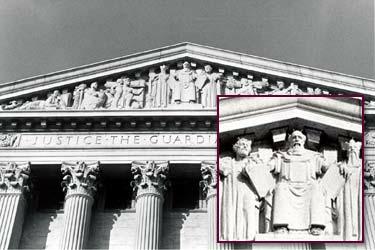
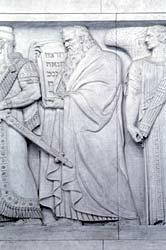
As you enter the Supreme Court courtroom, the two huge oak doors have the Ten Commandments engraved on each lower portion of each door.
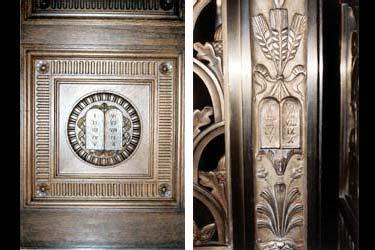
As you sit inside the courtroom, you can see the wall, right above where the Supreme Court judges sit, a display of the Ten Commandments!
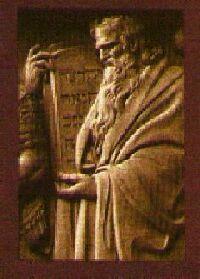
There are Bible verses etched in stone all over the Federal Buildings and Monuments in Washington, DC.
James Madison, the fourth president, known as "The Father of Our Constitution" made the following statement:
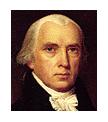
"We have staked the whole of all our political institutions upon the capacity of mankind for self-government, upon the capacity of each and all of us to govern ourselves, to control ourselves, to sustain ourselves according to the Ten Commandments of God."
Patrick Henry, that patriot and Founding Father of our country said:
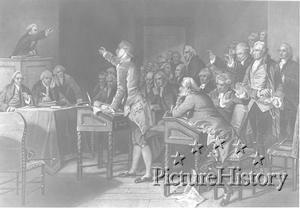
"It cannot be emphasized too strongly or too often that this great nation was founded not by religionists but by Christians, not on religions but on the Gospel of Jesus Christ."
Every session of Congress begins with a prayer by a paid preacher, whose salary has been paid by the taxpayer since 1777.

Chamber, USHouse of Representatives
Below are several links copied from the Wallbuilders site to resources that should be helpful to the serious reader. Wallbuilders has many such resources that are very worthwhile for study and use:
George Washington's Farewell AddressI urge you to watch a video entitled...
As you read Washington's closing thoughts at the end of his second administration, notice the principles that apply to all government, at all times. We have also added an outline and a select vocabulary for your convenience.Letters Between the Danbury Baptists and Thomas Jefferson
This exchange is the source for the infamous phrase, the "wall of separation between Church and State," as it pertains to the First Amendment.The Separation of Church and State
Learn more about the origin of the phrase "separation of church and state," the expression Justice William Rehnquist described as "a misleading metaphor."Ten Steps To Change America
Ten positive steps that will help restore America's Christian heritage.Republic v. Democracy
Our Founders had an opportunity to establish a democracy in America and chose not to. In fact, the Founders made clear that we were not, and were never to become, a democracy.Franklinís Appeal for Prayer at the Constitutional Convention
An analysis of Benjamin Franklin's appeal to have the clergy offer prayer at the convention of 1787.
Inner Strength: the Role of Faith in the Public Lives of George W. Bush, Rick Santorum and Zell Miller.
If you want to truly understand President Bush's faith, you can hear him describe it in his own words in this remarkable 28-minute documentary. This fast-paced documentary traces the tradition of American presidents from Washington to the present speaking about their faith. It is augmented by Senators Rick Santorum and Zell Miller speaking about their own faith in addition to their close-hand observations of President Bush's faith in action. It was produced by "Let Freedom Ring, Inc., a public policy non-profit organization, promoting conservative values and encouraging believers to be actively engaged in the political process. President Bush speaks of the importance of faith in his own life regularly, but most people never have the opportunity to hear him on this critically important subject. To view the video, click here, then choose the format and connection speed best suited to your computer

GOD'S IMPENDING JUDGMENT OF AMERICA
SINNERS IN THE HANDS OF AN ANGRY GOD
ARE YOU LONGING FOR HIS APPEARING?

